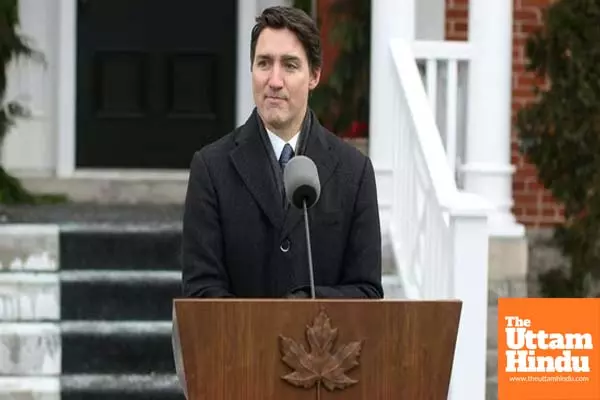
Justin Trudeau Resigns as Canada's Prime Minister Amid Party Dissent and Political Challenges

Ottawa, Canada (The Uttam Hindu): Justin Trudeau announced his resignation on Monday as leader of the Liberal Party of Canada effectively ending his nine-year tenure as Canada's Prime Minister. He will remain as a caretaker prime minister until a new leader is chosen. The decision comes in the wake of growing dissent within his party and declining public support.
Speaking at a press conference outside his residence at Rideau Cottage in Ottawa, Trudeau made the announcement in both English and French.
"I have informed my party and the Governor that I intend to resign as leader of the party as well as prime minister of Canada and will do so as soon as my successor is appointed through a robust nationwide competitive process," Trudeau said.
The 53-year-old acknowledged his leadership challenges stating that although he is a "fighter," the current parliament is "paralyzed." He announced the prorogation of Parliament until March 24 to allow the Liberal Party to initiate the leadership transition process ahead of the upcoming federal elections later this year.
"A new prime minister and leader of the party will carry its values and ideals into the next election and I am excited to see that process unfold," he added.
Reflections on Regrets and Electoral Reform
Trudeau expressed regret over not achieving electoral reform during his tenure. "If I have one regret, it’s that we couldn’t change the way we elect our governments in this country," he said, advocating for a ranked-choice voting system to counter polarization in politics.
Succession Plans and Leadership Contenders
Under Canadian law, the ruling party has 90 days to elect a new leader. Potential successors include:
- Dominic LeBlanc: Minister of Intergovernmental Affairs and current Finance Minister.
- Melanie Joly: Minister of Foreign Affairs, representing a Montreal-area riding.
- Francois-Philippe Champagne: Minister of Innovation, Science and Industry and former Foreign Minister.
- Mark Carney: Former Governor of the Bank of Canada and the Bank of England.
Trudeau’s Swipe at the Opposition
Trudeau used his resignation speech to criticize Pierre Poilievre, leader of the Conservative Party, accusing him of abandoning the fight against climate change and diversity. "Pierre Poilievre’s vision for Canada is not the right one," Trudeau said.
Internal Party Rebellion
Trudeau's leadership has faced increasing criticism from within the Liberal Party fueled by poor polling and dissatisfaction with his handling of key issues. Over 20 MPs reportedly signed a petition calling for his resignation while high-profile departures like Deputy Prime Minister Chrystia Freeland, who left in December over policy disagreements further weakened his position.
Economic and Diplomatic Challenges
The Canadian dollar which had been weakening, rebounded following Trudeau's resignation. His tenure has been marked by economic struggles including high inflation, slow growth and strained trade relations.
Relations with India also soured after Trudeau accused New Delhi of involvement in the killing of Khalistani activist Hardeep Singh Nijjar in Canada. India dismissed the claim as "absurd" and accused Trudeau of pandering to Khalistani sympathizers for political gain.
These allegations have strained bilateral ties with both nations expelling diplomats and Canada failing to provide conclusive evidence. Critics argue Trudeau’s approach has alienated many Canadians and worsened domestic and international relations.
As Trudeau steps down, Canada faces a crucial leadership transition amidst political, economic and diplomatic uncertainties.
- JustinTrudeauTrudeauResignationCanadaPoliticsLiberalPartyCanadaLeadershipChangeCanadaPMTrudeauLegacyCanadianElections2025PoliticalTransitionParliamentProroguedDominicLeBlancMelanieJolyFrancoisPhilippeChampagneMarkCarneyPierrePoilievreCanadaEconomyIndiaCanadaRelationsKhalistanControversyElectoralReformCanadianDollarPartyDissent

